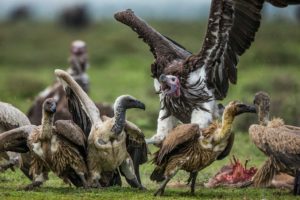The Nigerian Conservation Foundation (NCF) has embarked on a rescue mission tagged “Supporting Community-based Monitoring and Conservation for Vulture Populations in Identified Vulture Safe Zones Across Nigeria” in its efforts to tackle the declining population of vulture and its associated benefits to the people. The Indianapolis Zoo is said to be supporting the project, which is part of a series of activities to conserve remnant vultures in the country.

As the world commemorates the 2023 International Vulture Awareness Day (IVAD) on September 2, NCF says it is creating more awareness about importance of vulture in our society and harp on some critical efforts NCF has put in place to help improve the situation.
The Vulture Safe Zone (VSZ) project is one of the Foundation’s efforts designed to protect remnant vulture populations in their natural environment, support sustainable livelihoods, preserving the ecosystem benefits of the species and promote peaceful and positive coexistence between the people and the vultures. The goal of the project is to reverse the negative trends in the viable populations of vultures found in two selected sites in Nigeria.
Some of the VSZ activities include stakeholders’ engagement to identify threats and design livelihood alternatives to associated threats, and training of the local community on vulture population monitoring. These activities held from July 20 to 21, 2023, at Iruowelle Village Community Hall, Awka-Etiti Idemili South LGA of Anambra State.
The training focused on raising the capacity of community-based volunteers within the zones to methodically observe and report the trends in vulture populations in their community.
“This is important as it promotes species appreciation and consciousness within the community. The volunteers were also supported with monitoring equipment which includes six Binoculars, two GPS units, two Mobile Phones, data Sheets and other writing materials.
Nigeria is home to seven out of the 11 vultures species that exist in Africa. They are Egyptian Vulture – Neophron percnopterus (Endangered), Hooded Vulture – Necrosyrtes monachus (Endangered), White-backed Gyps africanus (Endangered), White-headed Vulture – Trigonoceps occipitalis (Vulnerable), Ruppell’s Griffon – Gyp rueppellii (Endangered), Palm-nut Vulture – Gypohierax angolensis (Least Concern) and Lappet-faced Vulture – Torgos tracheliotus – (Endangered).
The only species that seems to be thriving in the country are the Hooded Vulture and Palm-nut Vulture. Vulture, otherwise called nature’s sanitary prefect, is the only species of bird/wildlife that feed on carcasses without emitting disease into the atmosphere, unlike other scavengers. Absence of vulture will lead to outbreak of diseases such as anthrax and rabies, among others.
